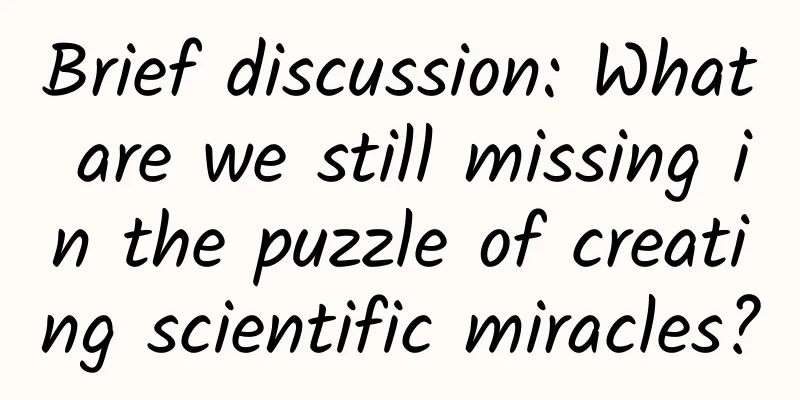Brief discussion: What are we still missing in the puzzle of creating scientific miracles?

|
Only free people can discover and love the truth; unfree people are incapable of discovering the truth. Written by Li Xia (Institute of History of Science and Science Culture, Shanghai Jiao Tong University) Now, the 2024 Nobel Prize in Natural Sciences has been announced. Although before the award was announced, as in previous years, our media occasionally speculated about which Chinese or Chinese people had a chance to be on the list, but in the end, there was no expected Chinese face among the seven scientists who won the award, and people were not surprised by such a result. It is no secret that there is a gap between us and the world's top level of science and technology. For this gap, we want to know what China is missing in the puzzle of creating scientific miracles? Although a few Nobel Prizes have been awarded for controversial scientific work, it is still generally recognized that Nobel Prize results represent major scientific breakthroughs. There should be little doubt that these major breakthroughs are scientific miracles, so how did these miracles come about? In this regard, we might as well analyze the components of the conventional model that supports scientific output one by one to see what we are missing from the puzzle of scientific research output. This simple decomposition and reduction method helps us find the real problems that affect scientific research output through comparison. Major breakthrough-level results only account for a very small part of the numerous scientific research outputs, and their appearance has very demanding requirements for supporting conditions. Existing research has fully proved that scientific output is highly sensitive to supporting conditions. When the basic supporting conditions are not available, it is difficult to have good scientific performance, let alone the occurrence of scientific miracles. Throughout human history, major scientific discoveries have been made in places with relatively abundant conditions, with almost no exceptions. Rather than looking at the deep water and admiring the fish, it is better to retreat and make a net. Based on the investigation of the history of scientific and technological development, we can decompose the elements that support the scientific research output model into five modules, namely resources (people, money, materials), accumulation, tradition, culture and freedom. In the past, our analysis of scientific and technological output mostly focused on the input-output analysis of visible resource elements, such as how many R&D researchers there are, how much scientific research investment there is, how many advanced instruments and equipment there are, etc. These are also the quantitative indicators that science and technology management departments and policy makers are most willing to implement. This is of course very important, but resource input alone is far from enough for the creation of scientific miracles, otherwise those wealthy Middle Eastern oil countries would have long been the world's scientific centers. In my opinion, the hidden factors behind the occurrence of scientific research miracles are what China needs to pay most attention to and solve at the moment. Moreover, the different arrangements and combinations of these five modules have also shaped the different scientific and technological development models and paths of the major scientific and technological powers in the world today. The degree of knowledge accumulation determines the minimum baseline of scientific and technological output. The richer the amount of knowledge accumulated in a country or region, the easier it is to receive the gift of historical accumulation, and the higher the level of cognition of the people in this place, the stronger their creativity will be. The author often uses the richness of ancient Greek culture to explain the reasons for the rise of modern science in Europe. For example, when Newton encountered the problem of action at a distance when proposing the law of universal gravitation, in order to solve how universal gravitation is transmitted in space, he borrowed Aristotle's ether theory and believed that the universe is full of colorless and transparent ether, and universal gravitation is transmitted through this ether. Although scientists later proved that ether does not exist, this ontological assumption is like the dotted line drawn in geometry to solve problems. Although it does not exist, it helped Newton solve that epoch-making problem. It can be seen that the richer the knowledge accumulation, the more conducive it is to knowledge output, and vice versa. People often talk about Japan's Nobel Prize plan: 30 Nobel Prizes will be produced in the next 50 years. The time is just halfway through and two-thirds of the task has been completed. The reason for this miracle is that Japan's knowledge accumulation is richer than ours. After the Meiji Restoration (1868), Japan fully accepted the Western model. In the late Qing Dynasty, the Westernization Movement adopted a restrictive knowledge accumulation model of "Chinese learning for body and Western use for practical use", which led to poorer performance than Japan in terms of knowledge accumulation speed and quality. This model has continued to this day, so Japan's scientific and technological performance is much better than ours. Since the reform and opening up, especially since the new century, China has greatly accelerated the speed of knowledge accumulation. However, there are too many historical debts, and it is not possible to completely complete the gorgeous transformation of knowledge accumulation overnight. In general, China still needs to further improve its accumulation of scientific knowledge. This hidden gap has gradually emerged in our participation in international competition. For example, this year's Nobel Prizes in Physics and Chemistry are both related to artificial intelligence, and the Turing Award, which marks the highest achievement in the field of artificial intelligence, has a total of 77 winners by the end of 2023, of which 55 American scientists have won the Turing Award, accounting for more than 70%. In addition, almost all major artificial intelligence companies are in the United States, so it is only natural that the United States leads in this field. This shows that knowledge accumulation plays an important role in innovation. As a default ethical framework, tradition has a strong role in regulating and guiding human behavior. Regions with scientific traditions can easily reach a consensus on scientific research topics. Everything can be done step by step, and they will not be misled by blind command and other absurd behaviors. The power of tradition lies in that it is a summary of past experience. Once formed, it has the function of stability and resistance to interference from social factors. Over time, regions with clear and clear scientific research traditions have relatively low learning costs, and mature norms can greatly reduce the uncertainty in scientific research behavior. These normative advantages ultimately make the area a rich place for scientific research output. Unfortunately, our scientific tradition history is not long, and many things still need to be learned and accumulated, which leads to us paying more trial and error costs in this regard than developed countries, which in turn affects the quantity and quality of our scientific research output in general. For example, the frequent occurrence of scientific research misconduct is an extreme manifestation of this situation. Culture constitutes the underlying logic of the scientific research ecological environment. The sociologist of science Merton once pointed out that the spiritual temperament and ethical norms conveyed by Puritanism in Britain in the 17th century directly contributed to the outbreak of the British Scientific Revolution, and scientific miracles frequently emerged. Moreover, more and more studies have shown that the overall scientific research performance of countries that believe in Puritanism/Protestantism is better than that of countries that believe in Catholicism. This is a classic case of culture promoting the development of science. On the contrary, if a country's traditional culture lacks the spiritual temperament and ethical norms that are compatible with science, and directly applies the vulgar pragmatic spiritual temperament at the level of life to the field of science and technology, its inherent defects will naturally be brought to the field of science and technology, resulting in the ruthless neglect of useless research in science (research far away from life). This is also the reason why domestic scholars are actively promoting the construction of scientific culture. Freedom is the soul of all innovative behaviors. Regions with high degrees of freedom have stronger innovation capabilities, and vice versa. Looking at the history of world science and technology development, this is true. The reason for this is that freedom is highly consistent with the core purpose of scientific exploration. As we all know, scientific exploration is a process of pursuing truth, and truth is closely related to the state of human existence. This is also a great discovery of 20th century philosophy: truth marks the freedom of beings. In other words, only free people can discover and love the truth, while unfree people are incapable of discovering the truth. Where does freedom come from? Freedom is the product of institutional arrangements, which requires the system to defend its virtues, create a free and relaxed environment, and clear obstacles for innovation. The Physics Prize is undoubtedly the most hardcore of the Nobel Prizes. In history, six Chinese scientists have won the prize. Without exception, they were in a relaxed and free environment when they made important academic achievements. In the short term, we should release the constraints on scientific researchers as soon as possible, let them return to their main business, and free them from all kinds of complicated paperwork and meetings. After all, knowledge production is a function of time. Studies have shown that the proportion of effective time of Chinese scientific researchers occupied by miscellaneous matters is much higher than that of foreign scientists. This has led to Chinese scientists having to use extra time to make up for this deficit, which not only makes Chinese scientists work harder than foreign scientists, but also wastes the energy of the entire society. Complicated paperwork and meetings not only take up effective time, but also lead to the loss of personal freedom. In summary, in the puzzle of knowledge production in China, our biggest advantage lies in resource investment. Secondly, due to the huge size and scale of China's science and technology, as long as we calm down, we have advantages in knowledge accumulation that other countries do not have, and this shortcoming will soon catch up. Since the new century, our scientific research tradition has also been rapidly constructed and iterated, and cultural modules are also being continuously updated. Relatively speaking, the lack of freedom should be made up as soon as possible to release the institutional dividends. In this sense, as long as Chinese science and technology further improves these weak puzzles, it is expected that scientific miracles will frequently emerge here in time. After all, this year's Nobel Prize results in physics and physiology were made in the 1980s and 1990s, lagging behind for more than 30 years. If we can piece together the science and technology puzzle as soon as possible and use thirty years as a yardstick, then from the beginning of the new century to 2035 will be the time for us to test the puzzle results. Special Tips 1. Go to the "Featured Column" at the bottom of the menu of the "Fanpu" WeChat public account to read a series of popular science articles on different topics. 2. Fanpu provides a function to search articles by month. Follow the official account and reply with the four-digit year + month, such as "1903", to get the article index for March 2019, and so on. Copyright statement: Personal forwarding is welcome. Any form of media or organization is not allowed to reprint or excerpt without authorization. For reprint authorization, please contact the backstage of the "Fanpu" WeChat public account. |
<<: Boiling tea around the fire, someone got infected
>>: Should you remove the foam from stewed meat or soup? You may miss the real "essence"
Recommend
WeChat “Tap”: the greatest common denominator of socializing with acquaintances and strangers
The day before yesterday, the WeChat team announc...
Platform-based brand marketing strategy!
There are huge differences in brand marketing bet...
The "constellations" composed of stars are not used for fortune-telling!
We already know that the sky is filled with twink...
Operation and promotion plan after the event goes online!
First look at this picture: I divided the operati...
What is the secret to AO Smith’s success in innovation?
Mastering "core technology" is the capi...
Practical application of Internet finance: Who touched your promotion fees?
If you are attracting new customers for an Intern...
Commercialization and monetization guide: How to improve the eCPM of information flow advertising?
Information flow advertising is almost a must for...
Methods and key points for operating and promoting online activities!
I think the most important thing in the process o...
I heard that marble has radiation? The mineral that can really harm you is...
"Marble has radiation, it is dangerous to ke...
A simple and crude front-end and back-end separation solution
[[155800]] Project Background I just finished a p...
Community operation and promotion: How to build a successful community?
In the Internet environment, the definition of pr...
You can lower your blood pressure without dieting. Check out this high blood pressure diet guide
Contributed by "Panda Medical Cartoons"...
Double 11 Metaverse brand marketing trends!
Some brands no longer know how to conduct Double ...
Solving the safety issues of ternary lithium, increasing energy density by 9.4%, GAC Aion releases magazine-type battery
The battery pack is the core component of electri...
Why is China's Sky Eye built in Guizhou?
Mixed Knowledge Specially designed to cure confus...

![Meiyajia: Quickly and easily understand store operations [WeChat Enterprise Account Case]](/upload/images/67ebf28d46903.webp)







